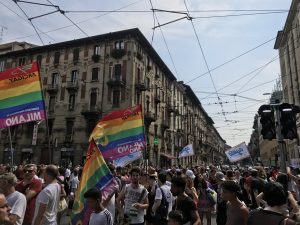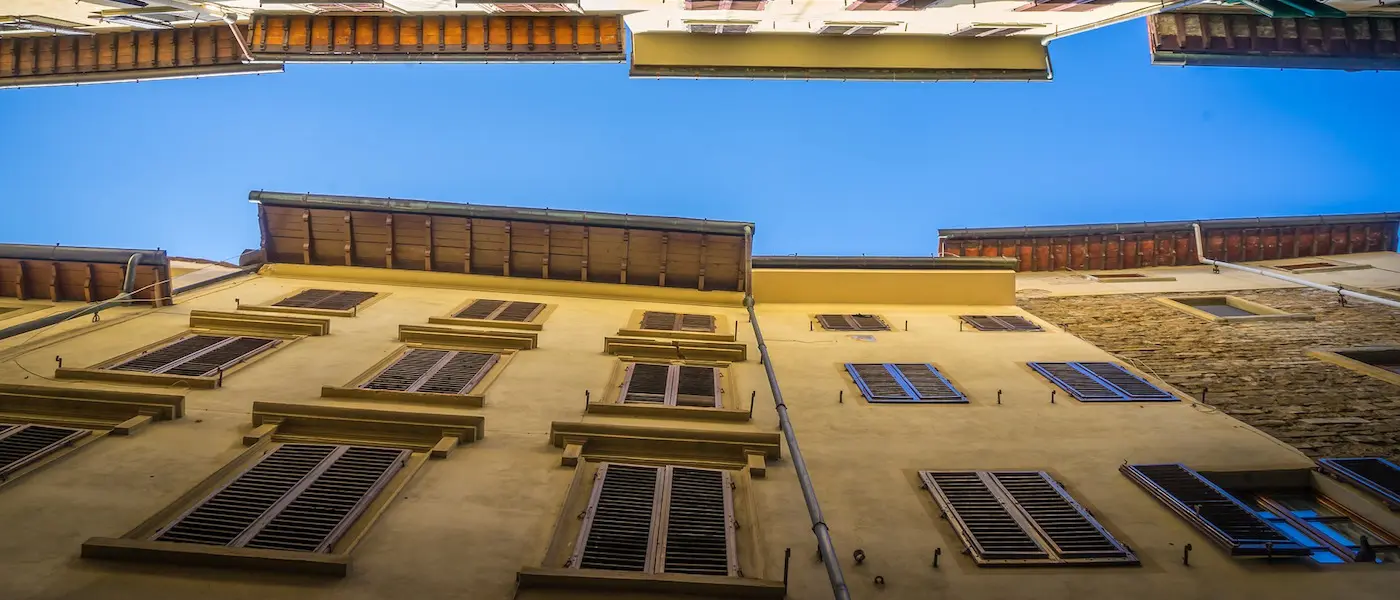IIE Open Doors 2018 surveys put Italy at one of the top destinations for study abroad students. When advising students about their host country, how do we answer those questions concerning LGBTQIA+ culture and safety? Having lived in Italy for 6+ years and as a queer person, I can offer my experience and other resources to paint a picture of today’s LGBTQIA+ culture in Italy.

View of Pride Festivities in Milan, Italy
1. Regional Differences
Italy’s regions offer a diverse outlook for LGBTQIA+ individuals. Larger cities are progressive leaning and have a vibrant queer culture, while smaller towns lean more toward the conservative. Despite this, acceptance is growing throughout the country, and a 2013 Pew Research Center Survey demonstrates a steadily growing number of associations and queer events.
2. Queer Cultural Events
One such association is Arcigay. Founded in 1980, Arcigay is Italy’s first and largest national gay organization. Its committees offer resources for LGBTQIA+ individuals that range from social events to transgender clinics. Wonderfully enough, much-cherished Tuscany takes the lead in creating inclusive platforms for queer individuals; in 2010, Tuscany became the first region to create a dedicated portal for gay tourism. Check out the Florence Queer Festival for LGBTQIA+ narratives in film and art!
3. Federal Laws, Policies & Protections
Great resources to understand LGBTQIA+ sentiment and laws in a host country include EqualDex , Rainbow Europe , and The US State Department . Rainbow Europe, an online tool that measures the legal index and social climate for LGBTI people in European countries, gives Italy a score of 32 out of 49 in terms of protective legislation for queer individuals. Federal policies include:
– Equality & Non-discrimination employment laws
– Registered same-sex partnerships
– Transgender marriage rights
– Legal measures to change gender marker
– Legal claim for asylum based on sexual orientation or gender identity
The same can be said for policies and protocols adopted by Italian municipalities. For instance, Reggio Emilia protects queer rights in public institutions by:
– Establishing inclusive toilets
– Allowing affirming names on student ID cards
– Offering inclusive language on medical forms
– Encouraging educators and parents to discuss gender issues
4. Bathrooms
Transgender and non-binary students regularly ask about the safety of using bathrooms abroad that align with their gender identity. Though there are establishments that have gender segregated bathrooms (looking at you, train stations), this is a non-issue for the most part—many establishments like restaurants, bars, cafes, and small businesses generally have one bathroom for patrons. When in doubt, encourage students to use their better judgment.
5. Personal Growth & Identity in Florence, A Student’s Account
Students may find that their time in Italy allows for identity exploration. Seth Harrington (they, them, theirs) is a student from California State University, Long Beach. They attended two summer programs with SAI Programs in 2015 and 2016, both based in Florence, Italy and I had the chance to ask them about how both stays buoyed their identity and self-discovery.

Seth Harrington during their time in Florence, Italy
“I had the opportunity to study abroad as a student and the next year help lead a study abroad trip as the Director of Activities. Both experiences offered a lot of opportunities for growth in my identity. When I went as a student I was just starting to accept my own coming out and the trip abroad really helped me to feel free; there were so many new people and experiences to process that I couldn’t focus on the image of myself that I’d held onto for so long. I didn’t have the time or energy to do that- there were new experiences in a place without expectations for me that I needed to do! I had been out for a bit less than a year when I went back to help lead a study abroad trip. Going back felt like home because I had become so comfortable with myself as a person and loved my time there the year before. I felt able to cement my identity as a queer person and feel strong and relaxed in that identity; studying abroad was a leisurely, luxurious experience and learning about my queer Self and really experiencing it during that luxurious time allowed me to feel connected with that part of myself in a way that didn’t have pressure.
My interactions with the culture in Italy sort of gave me the approval to become a different, more fully-fledged person. I was able to visit and spend time at art gallery openings, museums, churches, piazzas, fancy restaurants, regular cafes, parks, gardens, stores, markets, and so many other places. I rode on ferries, trains, buses, and trolleys. I had what I consider to be a very inclusive series of experiences that made me feel like I could be my own individual and I can operate in the world as a unique person and a capable adult. I was able to have fun with my life and feel free. ”
Seth’s response illustrates just how important studying abroad is for all our students, especially those falling under the queer umbrella. In April of this year, Barack Obama did an interview with BBC about the vitalness of travel in forging connections, inspiring transformation and building empathy. Ever the eloquent, he recalled his own travels: “those kinds of trips are memorable because they’re part of you as a young person trying to discover what your place in the world is.” You can read his full interview here. http://www.bbc.com/travel/story/20190425-barack-obama-on-why-travel-matters
And for any of you advising students traveling to Italy, I hope these resources prove useful in encouraging students!


Comments
No comments yet